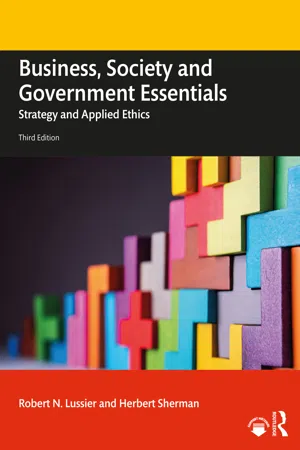
Business, Society and Government Essentials
Strategy and Applied Ethics
- 624 pages
- English
- ePUB (mobile friendly)
- Available on iOS & Android
Business, Society and Government Essentials
Strategy and Applied Ethics
About this book
Understanding the interrelationship of business, society and government is vital to working at any level in an organization of any size. This text develops strategic management skills using an applied ethics approach, primarily through a case study analysis pedagogy, to develop and implement ethical strategies in today's high-tech global community.
The authors crystallize the complex array of issues that business leaders, managers, and employees face in market and nonmarket environments, from balancing stakeholder interests and dealing with government regulations to managing crises and making socially responsible and ethical decisions. Technical concepts come to life through a variety of cases and case questions, thought-provoking personal and professional applications, ethical dilemmas, and practical exercises. Furthermore, an appendix offers approaches to case analysis and includes a case analysis table that serves as a model for students and professors. Thoroughly revised and updated, the third edition includes discussions on the influence of globalization and technology, the impact of COVID-19, and greater focus on developing ethical strategies.
With its thorough coverage of relevant issues and skill-building elements to stimulate critical thinking, this text will engage and prepare students to understand and confront real-world business issues by developing and implementing ethical strategies through case analysis of companies and analysis of organizational ethical dilemmas.
Frequently asked questions
- Essential is ideal for learners and professionals who enjoy exploring a wide range of subjects. Access the Essential Library with 800,000+ trusted titles and best-sellers across business, personal growth, and the humanities. Includes unlimited reading time and Standard Read Aloud voice.
- Complete: Perfect for advanced learners and researchers needing full, unrestricted access. Unlock 1.4M+ books across hundreds of subjects, including academic and specialized titles. The Complete Plan also includes advanced features like Premium Read Aloud and Research Assistant.
Please note we cannot support devices running on iOS 13 and Android 7 or earlier. Learn more about using the app.
Information
Part 1
THE INTERRELATIONSHIP OF BUSINESS, SOCIETY AND GOVERNMENT
Chapter 1THE BUSINESS, SOCIETY AND GOVERNMENT ETHICAL INTERRELATIONSHIP STAKEHOLDER ENVIRONMENT
Chapter Overview
- What are the course and this textbook all about?
- How can taking this course and reading this textbook benefit your personal and professional lives?
- How do business, society and government influence each other and you?
Learning Competencies
- 1–1. Characterize business, society and government and explain their interrelationships
- 1–2. Differentiate the market and nonmarket environments and state how they influence each other
- 1–3. Explain the nonmarket society and government environments and how they affect business
- 1–4. Contrast the political and legal environments, briefly stating what each branch of government does, and summarize their balance of power
- 1–5. Discuss the role of business and its managers, including stakeholders
- 1–6. Define “strategy,” differentiate market and nonmarket strategies, and describe the need to integrate them
- 1–7. Define the following key terms (in order of appearance in the chapter):
| business | nonmarket society environment | lying |
| product | public sentiment | cheating |
| society | political environment | stealing |
| societal interest groups | legal environment | moral management |
| government | strategy | amoral managers |
| special interest groups | market strategies | values |
| social problems | nonmarket strategies | business ethics |
| stakeholders market environment | ethics | |
| nonmarket environment | honesty |
Chapter Outline
- Why Study Business, Society and Government?
- How Government and Society Affect Business
- Business, Society and Government and Interactions With Them
- Capitalism, Pluralism, and Special Interest Groups
- Benefits to Your Personal and Professional Lives
- The Business, Society and Government Environment
- Stakeholders and the Environment
- The Market Environment
- The Nonmarket Society Environment
- The Nonmarket Government Environment
- The Global Macroenvironment
- The Role of Business and Its Managers
- The Role of Business and the Responsibility to Be Ethical With Stakeholders
- The Role of Managers and Strategy
- Our Approach to the Book
- The Strategy Approach
- The Applied Ethics Approach
- Structure of the Book
What’s This Chapter About?1
CASE
- What are the main ethical issues when it comes to Twitter and the way they operate?
- What are some of the social problems affecting Twitter?
- Identify the key stakeholders in this case.
- If you were the president of Twitter, what nonmarket actions would you take relative to the stakeholders addressed in question 3?
WHY STUDY BU...
Table of contents
- Cover
- Half Title
- Title
- Copyright
- Contents
- Preface
- List of Case Studies
- Part 1: The Interrelationship of Business, Society and Government
- Part 2: Business
- Part 3: Society
- Part 4: Government
- Part 5: International Business, Society and Government
- Appendix: Case Analysis Approaches
- Index